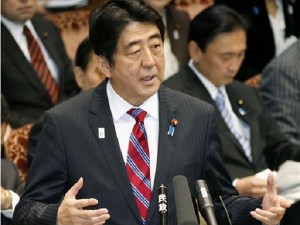On July 26 and 27, yet another important page in the history of Philippine-Japanese relations will be written with the visit of Japanese Prime Minister Shinzo Abe to the Philippines on the invitation of President Aquino.
The visit attests to the particular importance given by the Abe administration to the Philippines, being one of Japan’s recognized bilateral strategic partners.
Since 1956, bilateral relations have been mutually beneficial and characterized by cooperation in a wide range of fields.
More important, Philippines-Japan ties stand out in the region for being underpinned by a strong, shared adherence to the values of democracy, humanitarian principles and the rule of law.
The Philippines attaches much value to the prime minister’s visit, as it elevates the Philippines-Japan strategic partnership to an even higher plane of vigor, dynamism and relevance.
It is the first visit during the prime minister’s second term. He was also the last Japanese prime minister to visit the Philippines, in 2006.
The visit comes at a most propitious time, with both countries undergoing an economic renaissance and riding a wave of renewed optimism and international confidence.
Abe will visit a Philippines that has become Asia’s fastest-growing and most resilient economy.
Top profit center
Japanese interest in the country is reaching new heights, buttressed by sterling economic indicators and investment-grade ratings, and, according to Japan External Trade Organization, a standing as the top profit center for Japanese businesses operating in the region.
Similarly, Japan seems poised for an economic revival under Abe. “Abenomics”—combining aggressive reflation, fiscal stimulus, reform and restructuring—has captured world attention and appears to be making inroads in revving up the world’s third-largest economy.
It is against this positive backdrop that Mr. Aquino and Abe will hold their summit meeting.
Both leaders are expected to commit themselves to the comprehensive enhancement of the strategic partnership.
They will take stock of gains in the relationship and chart the path of bilateral cooperation, with an eye to making their bilateral ties the region’s most economically vibrant and a pillar of regional security and stability.
Philippine development
Certainly, the visit signals Japan’s steady commitment to Philippine development. Japan is our top trading partner, top source of official development assistance, and one of its largest sources of foreign direct investment and foreign tourists. In 2012 two-way trade reached $16.33 billion, while approved investments from Japan hit P69.04 billion.
The visit is seen as catalyzing Japan’s support for the Aquino administration’s priority programs in infrastructure development, the improvement of the business environment, disaster preparedness and other critical areas.
Japan has enthusiastically welcomed the progress in the peace talks between the Philippine government and the Moro Islamic Liberation Front and the signing of the Framework Agreement on the Bangsamoro.
Abe’s visit will see Japan’s continued backing for peace and development in Mindanao through political support and economic assistance.
Regional challenges
As the Philippines and Japan are maritime nations bound by shared values and a shared recognition of prevailing regional challenges, the enhancement of the strategic partnership in the political-security arena also stands to receive a big boost from the meeting between the two leaders.
The meeting will provide an occasion for a review of the prevailing regional security environment and for the two countries to pledge a common stand in support of the rule of law and the just and peaceful resolution of disputes, including those related to global maritime commons.
Finally, Abe’s visit is also expected to propel forward our people-to-people ties, including reciprocal tourism and youth exchanges. This is timely. More and more Japanese tourists— 412,474 in 2012—are discovering why “it’s more fun in the Philippines.”
Japan, meanwhile, is turning to Filipinos and other Association of Southeast Asian Nations (Asean) countries to rev up inbound tourism.
Abe heads to a Philippines that, in the words of President Aquino, is “ready to take our place as a reliable member of the community of nations, a nation serious about its commitments and which harmonizes its national interests with its international responsibilities … a predictable and consistent place for investment, a nation where everyone will say, ‘It all works.’”
The Philippines is truly open for business and warmly welcomes Abe to its shores.
(The author is Philippine Ambassador to Japan)
